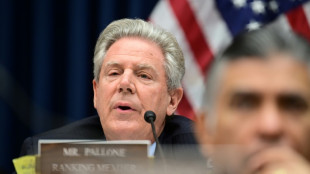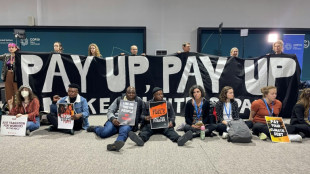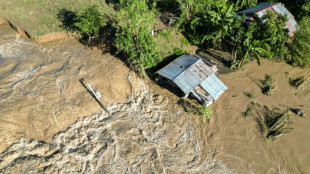
-
 Macron tells Xi he shares desire for 'durable peace' in Ukraine
Macron tells Xi he shares desire for 'durable peace' in Ukraine
-
Ruthless Japan beat China to move to brink of World Cup qualification

-
 French farmers threaten 'chaos' over proposed EU-Mercosur deal
French farmers threaten 'chaos' over proposed EU-Mercosur deal
-
Brazil arrests G20 guards over alleged 2022 Lula assassination plot

-
 China's Xi urges 'strategic' ties in talks with Germany's Scholz
China's Xi urges 'strategic' ties in talks with Germany's Scholz
-
Raducanu gives Britain lead on Slovakia in BJK Cup semis

-
 Russia says Ukraine fired first US-long range missiles
Russia says Ukraine fired first US-long range missiles
-
COP29 negotiators strive for deal after G20 'marching orders'

-
 Walmart lifts full-year forecast after strong Q3
Walmart lifts full-year forecast after strong Q3
-
British farmers protest in London over inheritance tax change

-
 NATO holds large Arctic exercises in Russia's backyard
NATO holds large Arctic exercises in Russia's backyard
-
Trouble brews in India's Manipur state

-
 Son of Norwegian princess arrested on suspicion of rape
Son of Norwegian princess arrested on suspicion of rape
-
Romanian court says 'irregularities' in influencer Andrew Tate's indictment

-
 Iran faces fresh censure over lack of cooperation at UN nuclear meeting
Iran faces fresh censure over lack of cooperation at UN nuclear meeting
-
Despondency and defiance as 45 Hong Kong campaigners jailed

-
 Scholar, lawmakers and journalist among Hong Kongers jailed
Scholar, lawmakers and journalist among Hong Kongers jailed
-
European stocks slide on fears of Russia-Ukraine escalation

-
 Police break up Georgia vote protest as president mounts court challenge
Police break up Georgia vote protest as president mounts court challenge
-
Spain royals visit flood epicentre after chaotic trip

-
 France's Gisele Pelicot says 'macho' society must change attitude on rape
France's Gisele Pelicot says 'macho' society must change attitude on rape
-
G20 leaders talk climate, wars -- and brace for Trump's return

-
 US lawmaker accuses Azerbaijan in near 'assault' at COP29
US lawmaker accuses Azerbaijan in near 'assault' at COP29
-
Tuchel's England have 'tools' to win World Cup, says Carsley

-
 Federer hails 'historic' Nadal ahead of imminent retirement
Federer hails 'historic' Nadal ahead of imminent retirement
-
Ukraine vows no surrender, Kremlin issues nuke threat on 1,000th day of war

-
 Novo Nordisk's obesity drug Wegovy goes on sale in China
Novo Nordisk's obesity drug Wegovy goes on sale in China
-
Spain royals to visit flood epicentre after chaotic trip: media

-
 French farmers step up protests against EU-Mercosur deal
French farmers step up protests against EU-Mercosur deal
-
Rose says Europe Ryder Cup stars play 'for the badge' not money

-
 Negotiators seek to break COP29 impasse after G20 'marching orders'
Negotiators seek to break COP29 impasse after G20 'marching orders'
-
Burst dike leaves Filipino farmers under water

-
 Markets rally after US bounce as Nvidia comes into focus
Markets rally after US bounce as Nvidia comes into focus
-
Crisis-hit Thyssenkrupp books another hefty annual loss

-
 US envoy in Lebanon for talks on halting Israel-Hezbollah war
US envoy in Lebanon for talks on halting Israel-Hezbollah war
-
India to send 5,000 extra troops to quell Manipur unrest

-
 Sex, drugs and gritty reality on Prague's underworld tours
Sex, drugs and gritty reality on Prague's underworld tours
-
Farmers descend on London to overturn inheritance tax change

-
 Clippers upset Warriors, Lillard saves Bucks
Clippers upset Warriors, Lillard saves Bucks
-
Acquitted 'Hong Kong 47' defendant sees freedom as responsibility

-
 Floods strike thousands of houses in northern Philippines
Floods strike thousands of houses in northern Philippines
-
Illegal farm fires fuel Indian capital's smog misery

-
 SpaceX set for Starship's next flight, Trump expected to attend
SpaceX set for Starship's next flight, Trump expected to attend
-
Texans cruise as Cowboys crisis deepens

-
 Do the Donald! Trump dance takes US sport by storm
Do the Donald! Trump dance takes US sport by storm
-
Home hero Cameron Smith desperate for first win of 2024 at Australian PGA

-
 Team Trump assails Biden decision on missiles for Ukraine
Team Trump assails Biden decision on missiles for Ukraine
-
Hong Kong court jails 45 democracy campaigners on subversion charges

-
 Several children injured in car crash at central China school
Several children injured in car crash at central China school
-
Urban mosquito sparks malaria surge in East Africa

| RYCEF | 1.15% | 6.93 | $ | |
| CMSC | 0.22% | 24.624 | $ | |
| RELX | -0.13% | 44.98 | $ | |
| GSK | -1.32% | 33.25 | $ | |
| VOD | -0.96% | 8.835 | $ | |
| RBGPF | -0.74% | 59.75 | $ | |
| NGG | 0.57% | 63.26 | $ | |
| BTI | -0.36% | 36.55 | $ | |
| RIO | -0.4% | 61.87 | $ | |
| BP | -1.66% | 28.94 | $ | |
| CMSD | -0.21% | 24.39 | $ | |
| BCC | 1.02% | 141.54 | $ | |
| SCS | -0.76% | 13.1 | $ | |
| JRI | 0.98% | 13.23 | $ | |
| BCE | -0.67% | 27.05 | $ | |
| AZN | 0.27% | 63.56 | $ |

Australian TV anchor has closed China trial on state secrets charges
The sentencing of Australian journalist Cheng Lei by a Chinese court over accusations of supplying state secrets overseas was deferred on Thursday, with Canberra decrying the trial of a woman detained for 18 months so far as "closed and opaque".
Cheng -- a mother-of-two and a former anchor on Beijing's state broadcaster CGTN -- has been detained since August 2020. In February last year she was formally arrested for "illegally supplying state secrets overseas".
But Chinese authorities have given no further information on the allegations against her and on Thursday denied the Australian ambassador to China and other diplomats access to the court.
"Regrettably, the Ambassador was not permitted entry to the court," Australian foreign minister Marise Payne said in a statement after Thursday's hearing.
"The continuing lack of transparency is concerning and further undermines confidence," she said, describing it as a "closed and opaque process".
The court had "deferred its verdict", she added.
Cheng could face life imprisonment if deemed to have committed serious violations of China's national security laws.
A statement from her family said "her two children and elderly parents miss her immensely and sincerely hope to reunite with her as soon as possible".
Concerns have swirled over her welfare and detention conditions.
Payne said Canberra was also advocating for Cheng to be allowed to speak to her two young children in Australia, who she has not had contact with since being detained in 2020.
Born in central China's Hunan province, Cheng emigrated to Australia as a child and later acquired citizenship of her adoptive country -- likely ditching her Chinese passport as Beijing does not permit its citizens to hold dual nationality.
After returning to China and joining the state broadcaster in 2012, she became a familiar face on CGTN and hosted interviews with noted CEOs from around the world.
- Broader tensions -
Beijing said Thursday that Cheng's case was "going through the judicial process and the court will choose a date to announce the verdict".
Her "suspected crime is illegal provision of state secrets abroad and her case involves state secrets", said foreign ministry spokesman Wang Wenbin, justifying the closed-door trial.
Canberra "should not interfere with Chinese judicial organs' handling of cases in any form", he added.
Cheng's detention came as relations between Australia and China plunged to their lowest level in years.
Beijing has lashed out at Australia's use of foreign interference laws to block Chinese investment in sensitive sectors and examine Chinese influence on the country's public life.
Canberra's repeated calls for an independent enquiry into the origins of Covid-19 -- which first emerged in China over two years ago -- have also raised Beijing's hackles.
Weeks before Cheng disappeared, Australian authorities raided the homes of Chinese state media journalists as part of a foreign interference probe.
The timing of her detention and the lack of clarity about the charges against her led to speculation that her detention was politically motivated or tit-for-tat retaliation.
Two Australian journalists, Bill Birtles and Michael Smith, later fled China after being questioned about Cheng.
Months after her detention, Chinese authorities also detained Bloomberg News employee Haze Fan -- a Chinese citizen -- on allegations of endangering national security.
Another Chinese-born Australian, writer Yang Jun, has been accused by Beijing of espionage and is facing a trial that started last year behind closed doors.
D.Lopez--AT
